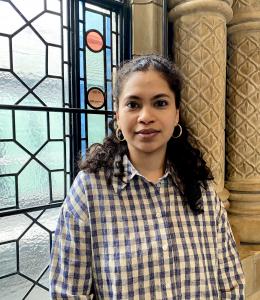
Dr Sheelalipi Sahana
Heritage Collections Research Fellow, September 2025 - February 2026
Home Institution: University of Edinburgh
Dr Sheelalipi Sahana completed her PhD in English Literature from the University of Edinburgh. She specialises in postcolonial studies, South Asian studies, and gender and sexuality studies, with a focus on spatiality and materiality. Her thesis interrogates the architectural spaces that Muslim women occupied in 20th century India and how that shaped their modern identities. Sheelalipi has developed the methodological framework of ‘gendered spatiality’ to locate the agential operational networks in the interstices of gender, class, and power. Her work has been published in the Journal of Postcolonial Writing and South Asia: Journal of South Asian Studies.
She is the co-founder of Tasavvur Collective, a consortium of researchers interested in the social, historical and literary representation of South Asian Muslims in cultural productions. She has guest-edited the ‘Writing Muslim Women in South Asia’ Special Issue for South Asia: Journal of South Asian Studies.
Project title: Capturing Empire: Scottish Colonial Tourism and the Visual Spectacle
This project will draw on specific archival materials from Edinburgh University’s Heritage, Archive and Manuscript Collections to study the visual media produced by Scottish travellers, researchers, and academics to India in the 19th and 20th centuries. These visual and textual narratives of colonial travel and tourism underlie the overlooked side of Scottish Enlightenment, that was rooted in racialised hierarchies and eugenic discourses in the colonies. This research centres the school-going child within visual narratives, examining how, in moments of ‘double exposure’, they reclaim ontological selfhood and recognise their role within the Empire’s curation of ‘ethnographic spectacle’. Using decolonial methodologies, this project will bring to the forefront the unknown, unnamed figures captured on film, in photographs, and in illustrations, to centre the native counter-gaze.
